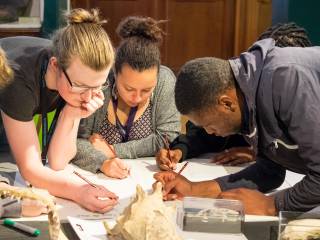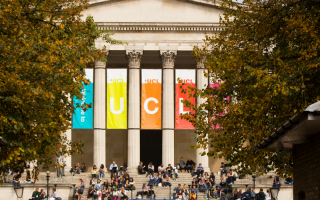Use your second year to build on the skills and experiences that will set you up for your final year and next steps beyond that.
What's different in year 2?

In your second year, you will find the emphasis shifts from transitioning and settling into university to utlisiing and building on a lot of the skills you started to develop in your first year. In your second year, you will want to be more purposeful about how you use your time and hone in on how to make the most of the opporutnities available to you to set you up for your study abroad year (if you are doing one), final year and whatever lies beyond that. Make sure make the most of discussions with your personal tutor and all the services offered by UCL Careers and by the careers team in your department to start planning early on for your next steps.
Advice from a UCL student
Katie Davies, a BA History, Politics & Economics UG student, shares her thoughts on some of the major differences between first and second year:
"Perhaps the most significant difference between first and second year is that your focus shifts: from making friends, joining societies and setting in; to studying, taking more senior roles in societies and thinking about what comes after university.
In second year, there is a level of expectation from your tutors and professors, beyond that of first year, to pro-actively find the resources you need each week. For example, it is expected you will find the paper you need from the given reading list rather than having the paper given to you. This isn’t to say Professors won’t help you – if you need help knowing where to find resources, just ask them! Another change is that there is a big increase in career focus.
In second year, many vacancies open to undergraduates – for example Summer Vacation Schemes at firms across all sectors. As you’re one step closer to graduating, this naturally becomes an increasing priority. Applications are time-consuming, so this is something you have to balance with your studies."
Your Education in 2022/23

A UCL education is designed to stretch your intellect, expand your experience and develop your skills. We want you to learn how to think - not what to think - through dynamic engagement with research-intensive learning. Our aim is to ensure that you are able to learn effectively by connecting with a wide range of people (peers, teachers, researchers, and other UCL communities) and cutting edge knowledge and research, while making links to impact in the wider world.
The start of a new academic year is an exciting part of your time at UCL and our campus will be open to all students in September 2022.
For more information on what this will entail view the following information:
Digital Education at UCL

The Digital Education at UCL Moodle course is designed to support you to be a successful digital learner.
It’s designed with a range of content and learning activities that:
- Ensure you have the tech you need
- Demonstrate how to use our core learning technologies
- Help you find and use academic resources
- Guide you towards help and support, and
- Enable you to become a confident and motivated Digital Learner.
 Close
Close

